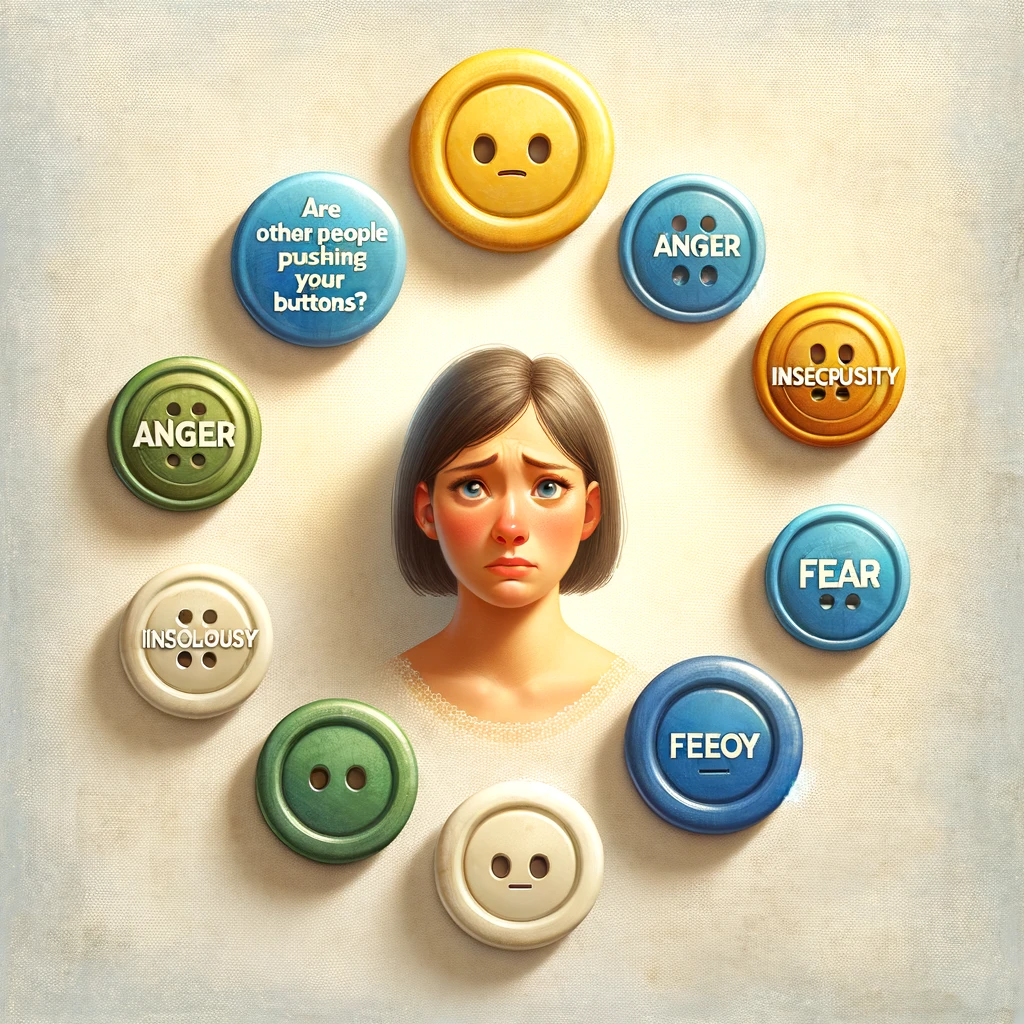We’ve all been there. Someone makes a random comment, and it drives you right up the wall.
Whenever something impacts us in such a deep way, it’s usually because we have that same belief or fear on some level. And when it gets verbalized, it gets on our very last nerve.
This reminds me of the story about a couple who had invited friends over for dinner. During the course of the meal, one of the guests asked, “Where did you get the meat?” The husband answered, “Joe’s Deli,” while the wife inquired, “Why – what’s wrong with it?” Two totally different responses to the same question.
While the guest may very well have wanted to compliment the hosts – or try out the deli himself – the hostess became defensive right off the bat. The question pushed her buttons, but not her husband’s. Why? Because, on some level, she felt insecure about the meal or needed external validation that it was okay. To her, the question appeared threatening. To her husband, it was a neutral question that deserved a factual answer. It didn’t push his buttons because he didn’t have that internalized doubt.
Do you choose to have your buttons pushed?
This point was driven home in a radio interview I heard recently with Kathy Freston, author of “Quantum Wellness.” Freston explained the theory that we’ve chosen to be in certain relationships for the lessons we need to learn. While I generally support this theory, her next comment really made me think. She said it’s the job of those with whom we’re in close relationships to push our buttons. Huh?
Freston’s explanation is that this is exactly what makes us grow. Hmmmmm …. so that spouse, partner, girlfriend, boyfriend, co-worker, friend or family member is pushing our buttons for our own good? I’ve never looked at it that way.
It’s all in how we handle the situation that determines our growth. We may be compliant and sweep things under the rug. Or, we may become aggressive. Neither of these approaches is particularly helpful. It’s when we can step back and examine the situation – beyond the heat of the moment – that growth can occur. Healthier boundaries may need to be set, for example.
What can you do about button pushing?
Behavioral changes happen first with our thoughts. So, as we examine the lesson in the button pushing, we can make choices about how to react in the future. Or, we can be more proactive and confront the “button pusher” who may or may not be aware of the impact that has occurred.
One of my favorite sayings is, “When we change the way we look at things, the things we look at change.” That’s certainly true in situations like this. Rather than singularly blaming the messenger, we can also choose to look at why the message had such an effect on us.
Of course, there are people who intentionally say hurtful things. That can be a result of their own insecurities. We all know those who need to put someone else down in order for them to feel good about themselves. In situations like these my husband, John, often says, “consider the source.” That’s helped me to process things more quickly at times.
My focus here revolves more around the random comments that strike such a strong chord in us, rather than the deliberate ones. Before giving over too much power, you may want to step back from the situation and examine why it hit you so hard. Chances are, you knowingly or unknowingly harbored a similar belief inside.
I have to admit it’s an interesting concept to try on. Like I said, I’ve never heard button pushers described in such a favorable light. It’s as if they’re just doing their jobs. And when I think of it this way, it helps to take back the power that may have been given away.
According to Dr. Albert Ellis, the author of “How to Keep People From Pushing Your Buttons,” events or people don’t make you angry or upset; it’s what you think about them that does. Ellis is widely regarded as the “father of cognitive behavioral thinking” in psychological circles. His book includes tools for dealing with button pushing incidents by breaking situations down to look at our own beliefs that may be irrational.
Ellis presents easy-to-follow methods and work sheets that show you how to defuse your own anger, guilt or depression when people persist in pushing your buttons. When practiced over time (and we all get lots of opportunities, right?), the result can be more peace in our inner worlds. Author Kimberley Cohen presents some ideas on dealing with these situations:
Tips for Dealing with Button Pushers
- Recognize where else this same feeling is being generated in your life. Chances are it’s not just from one person; it may be with other people or situations.
- Let go of the need to change the button pusher — to be right, to make them wrong, to control.
- Don’t have a pre-conceived expectation about how things “should be.”
- Remember that you have choices. You can choose not to let this person ruffle you, or you can let the feathers fly.
- You can make choices and set boundaries that are best for you, or continue to feel stressed and frustrated.
- You can try to change someone else, or you can change your reactions.
Button pushers come in small sizes, too. If you have children, you are likely well aware of this and may want to check out the Web site, www.familyeducation.com.
For those of you who may complain that “it’s just not fair,” I’m reminded of my friend Marilee’s response: “Fair’s in August.”


